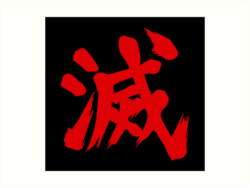Why is 六百 in Hiragana ろっぴゃく instead of ろっびゃく? Can anyone tell me why? - Feed Post by ay1994
Why is 六百 in Hiragana ろっぴゃく instead of ろっびゃく? Can anyone tell me why?
posted by ay1994 January 26, 2016 at 4:14am
Comments 5
 The く of ろく starts with an unvoiced consonant, so the ひゃ of ひゃく changes to っぴゃ, which also starts with an unvoiced consonant. You will rarely see the "consonant doubling" っ before a voiced consonant. In contrast, ん is voiced, so さん + ひゃく = さんびゃく.
The く of ろく starts with an unvoiced consonant, so the ひゃ of ひゃく changes to っぴゃ, which also starts with an unvoiced consonant. You will rarely see the "consonant doubling" っ before a voiced consonant. In contrast, ん is voiced, so さん + ひゃく = さんびゃく.
If you're asking for a simple rule you can learn regarding all sound changes of consonants, there is none. There are some patterns you will get used to after you learn a lot of examples, but there is no simple rule. For the moment, you need to memorize all of the sound changes which occur in numbers. These occur primarily after いち、さん、みつ and はち. ち and つ both change to っ followed by an unvoiced consonant.
In case you are not familiar with the terms "voiced" and "unvoiced", voiced consonants in English include 'z', 'd', 'g', 'b' and 'v'; the corresponding unvoiced consonants are 's', 't', 'k', 'p' and 'f'.January 26, 2016 at 4:42am I see. Thanks.January 26, 2016 at 7:24am
I see. Thanks.January 26, 2016 at 7:24am いえいえ~ ^^January 26, 2016 at 8:12am
いえいえ~ ^^January 26, 2016 at 8:12am Actually, I made it sound like a rule that 'h' changes to 'b' after syllabic 'n'. That's not true, unfortunately. For example, 散歩 = san + ho = sanpo. ごめん。January 26, 2016 at 8:18am
Actually, I made it sound like a rule that 'h' changes to 'b' after syllabic 'n'. That's not true, unfortunately. For example, 散歩 = san + ho = sanpo. ごめん。January 26, 2016 at 8:18am I think it's true that when the second syllable of an onyomi is く, ち or つ, it changes to っ followed by an unvoiced consonant-- I can't think of any counterexamples.January 26, 2016 at 8:27am
I think it's true that when the second syllable of an onyomi is く, ち or つ, it changes to っ followed by an unvoiced consonant-- I can't think of any counterexamples.January 26, 2016 at 8:27am
